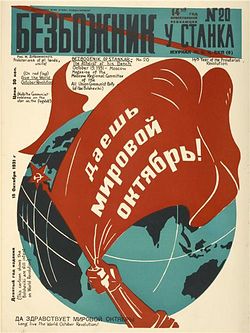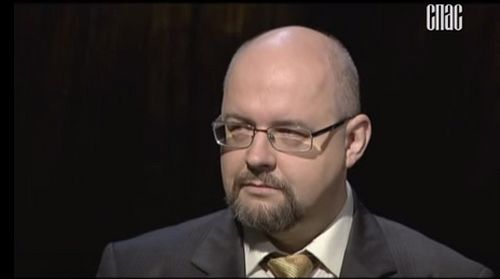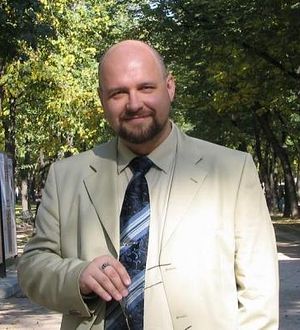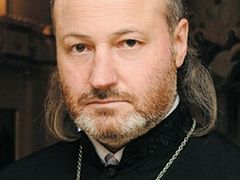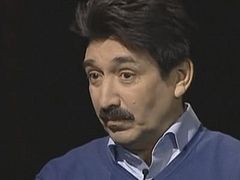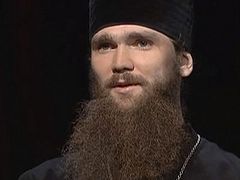We continue to publish the materials of Spas TV program “My Path To God”, where Priest George Maximov interviews people who converted to Orthodoxy after lengthy quests for the truth. Today, the guest of Father George’s program is Alexander Lyulka. Alexander read many atheistic and anti-Christian books trying to convince himself that Christianity was unviable, but discovered the depth and intellectual power of Orthodoxy instead. He will tell us how his intellectual quest led him to faith.
Priest George Maximov: Hello! You are watching My Path To God. The guest of today’s program is Alexander Vyacheslavovich Lyulka, the head of the Orthodox Missionary School. Alexander Vyacheslavovich, you were born in a family of scientists. Your grandfather invented the turbojet engine and there is a square in Moscow named after him. Your father is a scientist too. I would assume that your family had nothing to do with Orthodoxy, which was typical for the Soviet scientists. Is this assumption correct?
Alexander Lyulka: Yes, Father George, you are correct. As a child, I probably knew the legends and myths of Ancient Greece better than the teachings of the Church. Of course, when I walked in the city, I saw churches (mostly dilapidated), but there was not and could not be any religious education in my family. My mother was a member of the Communist Party and she was afraid to even walk into a church with me when she wanted to light a candle. Although when we travelled somewhere with mother, we would to go to a church, and even though I was not baptized she would ask me to light a candle for our health. However, I didn’t understand the meaning of it at all. It was simply some kind of a ritual…
Father George: One of the folk customs?
Alexander Lyulka: Yes, it was some kind of a folk custom for me. That was basically it. We didn’t celebrate any religious holidays. Naturally, my parents knew about Easter and Christmas, but they never told me about them. There could be problems if I ever told somebody at school that my parents said anything religious. Our family was absolutely secular. My father was baptized only one year before his death. My mother was baptized, but she wasn’t religious.
Father George: The social environment at that time was not simply indifferent, it promoted derisive attitude to Church and any active religiosity. I’ll tell you a story. I was baptized when I was a child. Once when my mother was dressing me to go to the kindergarten, she put my baptismal shirt on me. There was my baptismal cross in its pocket. In the kindergarten, I felt that there was something in my pocket and took out the cross. I didn’t even understand what it was, but when other children saw me holding this cross in my hand, they started pointing their fingers at me and laughing, shouting “You’re a believer!” The anti-religious propaganda at that time was so widespread that even preschoolers somehow knew that being a believer was laughable and that the believers should be ridiculed. I assume that you too were affected by this societal paradigm.
Alexander Lyulka: Definitely. I even was a member of some atheistic club at school. I was responsible for making a bulletin board newspaper. However, I don’t remember that part of my life very well. It is a typical story of a Soviet atheist; although we did have a Bible at home. That is, I knew that there was a Bible, but I also knew that we had the Quran as well. For me these were just some books that people believed in.
Father George: Just like myths and legends of the world?
When I was a child, I thought that Christianity was like the myths of the Ancient Greece and that people have already abandoned all these superstitions.
Alexander Lyulka: Yes. We also had the book of the myths of the world and I didn’t take them seriously either. That is, I read the myths of the Ancient Egypt or Ancient Greece and understood that people used to believe in them, but I found this ridiculous, because after 1917 everything changed in our country and people abandoned those superstitions. I remember that in Blue Cup, a short story by Gaidar, there was a scene when the main character and his daughter saw a priest. And the father said, “It is strange that we still have such people in our Soviet country.” This scene was absolutely out of place, but it was deliberately inserted in the book. Another example is a book by Ilf and Petrov that had a scene ridiculing a hermit saint! All popular books in the Soviet Union had to have some kind of atheistic element. The movies too. I grew up in such environment, just like the majority of people of the USSR.
Father George: How did you manage to take a new look at everything and see the faith in God from a different angle?
Alexander Lyulka: You know, as it is said in the Arabian Nights, “My story written by wrinkles in the corners of my eyes could be a valuable lesson for those willing to learn.” I did not get to know God because of some distress or serious spiritual shocks. My life was fairly quiet and normal.
Father George: I once spoke with an atheist who came up to me and said, “Please tell me how you found God.” I started telling him in great detail, but he interrupted me impatiently saying, “And then something terrible happened?” I said, “No, nothing terrible happened,” and continued my story. He listened to me for a while and then asked again, “And then something terrible happened?’ I said, “No nothing terrible happened. I didn’t believe in God because of something terrible that happened to me.” (laughs) That man thought that people become religious only if something terrible happens to them, and they need their faith to compensate for and somehow alleviate the suffering that they cannot otherwise handle. He wanted to believe that all religious people he met followed the same pattern. That was the reason he asked me—he just wanted to confirm his theory, but to his regret it didn’t happen. As I understand, your story doesn’t follow this pattern either?
Everything started with my attempt to understand what was happening with various nations of the world.
Alexander Lyulka: No, it doesn’t. I won’t delve too far into the past, although everything goes back to my childhood. I became seriously interested in these matters when I reached the age of reason. I read quite a few books and as I became interested in religion, it got me thinking. At first, I was simply curious and tried to understand what happened with people, what kind of nations were there and what they believed in. It was clear to me that religion professed by a person or a nation molded the character of that person or that nation. The influence of religion is fairly strong. That is why you can’t understand why a person or a nation behaves in a certain way unless you know what that person or nation believes in. You perceive the persons behavior differently, when you know that that person is Christian, Moslem, Jewish or pagan… That gives you some idea about that person. So for me it all started with my attempt to understand what was happening in the world.
I also remember another thing about my childhood: I always detested lies. My parents told me that I only cried hard a few times when I was a child and it happened when I realized that somebody lied to me. I think every person has that sense of truth and everyone is yearning to learn the truth. People can tell fairy tales as long as they want and invent any religions they like, but the matter of truth was always of utmost importance for me. The most important thing for me was finding out whether or not it was true—it didn’t matter to me if it was beautiful, convenient, understandable or easy to explain. This probably was the influence of my education. I graduated from the Faculty of Physics of the Moscow State University, where they always emphasized the importance of solid evidential foundation.
For a long time, I was learning about religion simply because of my adolescent curiosity. However, this interest became more serious when I started thinking, “Why do I live? Why do people live?” This was a purely academic interest, I personally didn’t suffer from any illnesses and wasn’t affected by deaths of any of my relatives. This interest came from my heart. The matter of truth is closer to one’s heart than to one’s mind. Religion promised to give me answers to these questions, so I decided to find out what it promised and how reliable that promise was.
The Gospel was something homey for me, something that was inherently native, and I thought that nothing could be interesting at home because all interesting things are somewhere far away.
I started reading the Gospel even before I was baptized. At that time, I wasn’t religious in any way, so I also read anti-Christian atheistic literature, some parts of Quran, as well as various compilations of myths of the world. None of the books I read satisfied my needs. However, I was still separated from the Gospel by some kind of a wall—It was something homey, something inherently native, and I thought that nothing can be interesting at home. Only the things that were far away seemed interesting to me: Asia, the East, maybe some Indian teachings. There must be something there, I thought. After studying them to the maximum extent possible, I realized that none of them gave me the answer. I could say, “I can think this up myself” about any religion that I studied. “I can say that a prophet will come, I can even be such a prophet myself.” It was obvious, that if you have a charismatic personality, you can find followers, just as celebrity actors or writers are always followed by fans. These celebrities may have never said anything clever, but they still have many followers ready to give their lives for them. In the light of things I learned from atheism, the story of Our Lord Jesus Christ and His earthly life seemed to be just like that. I was not interested in the Gospel, I had no eyes to read this book.
Father George: What happened next?
Alexander Lyulka: At some point, I emotionally understood that rather than simply thinking, it was necessary to make a certain step toward spiritual life. Since I lived in a traditionally Orthodox country, I started thinking about baptism. After a closer look at Orthodoxy, I understood that there was something there. Everything started to look attractive there. I started reading the Gospel in a totally different way. I remember that I was reading the Gospel while my mother was going about the house or having a rest and I kept on reading passages from the Gospel to her saying, “Look, how powerful and beautiful these words are.” However, this was based on pure emotion. In my mind I still had an atheistic view about Christianity, although in my heart I felt this amazing power of the Gospel. This was an emotional impulse and my mind has not accepted religion yet. Of course, I wasn’t even thinking about leading a religious life at that time.
I came to the Church of Life-Giving Trinity in Vorobyovy Gory because it was close to my university. I asked if I could be baptized. At that time, there was no catechesis and you could be baptized by simply asking for it. So they told me to come to the church at a certain time. As an obedient youth, I came there and was baptized.
Father George: Did anything change after the baptism?
My experience demonstrates the importance of attending catechesis before being baptized.
Alexander Lyulka: I remember the priest and the date. I remember coming in and going out of the church. I remember that something inside me changed and that I started looking at the world in a totally different way. This had such a great impact on me that even though I didn’t understand anything I felt that something had happened. I think that people who were baptized as adults would know what I’m talking about. However, as I mentioned, my mind was not involved in any way. That is why it is very important that nowadays our Church under the guidance of the Most Holy Patriarch is returning to the original tradition of mandatory catechesis before baptism. My experience is a proof of its importance. Because there was no catechesis, I didn’t understand that I had to lead a religious life now, so I gradually drifted away from religion. This serious sin occurred by chance. I started reading a book I bought at a bookstand and it made me think that Christianity was not what it purported to be and that there was some kind of deception there, some kind of psychological tricks. I started recalling the events that led me to religions and thought, “Yes, this was how I got converted, I was simply following my emotions.” I wouldn’t say that I renounced God, as I still believed in His existence, but the Church stopped being the embodiment of God for me. This was the tragedy of my life similar to the situation when the Jews and Moses came close to the Holy Land and were about to enter and inherit it, but because of their discontent and other things…
Father George: Because they trusted their own opinions too much.
I learned all about anti-Christian rhetoric, and the fact that I’m a member of the Church now is a proof of inadequacy of this rhetoric.
Alexander Lyulka: Exactly. They turned around and wandered in the desert for 40 years. During that period when I got disillusioned about Christianity, I started reading all the anti-Christian books that I came across. Now I understand that I did it to justify my actions, but according to God’s will this gave me an opportunity to read all the anti-Christian literature and learn about all anti-Christian rhetoric that existed in the world at that time. There are no new arguments nowadays either. The fact that I’m a member of the Church now, a believer confessing the Creed, despite having read every anti-Christian book ever published, is evidence of the absolute inadequacy of these arguments. I know them all. There’s nothing new.
I continued searching for the truth, but it was outside of the Church. I dispassionately studied every concept, ideology and outlook… I rejected pure atheism because confessing it was meaningless. If I originated from an ape, this means that I will die and some plants will grow on my grave, that’s all. What can this give me other than knowing that I am already living?
Father George: It makes the life meaningless.
Alexander Lyulka: Absolutely. I also read some books by Castaneda. I read some occult books… by Papus and others. I didn’t practice any of their teachings, but studied them methodically, looking for a scientific truth. I understood that it was all rubbish. I understood it while I wasn’t even Christian yet. I am sure that anyone can figure it out, if they take a sound approach. My interest in Islam was, perhaps, the greatest, because it is a world religion and I read a lot about it. I read the Quran for the first time then. Again, I didn’t practice this religion, I wasn’t touched by it at all. Basically, I just learned about all the religions that I could find.
I even went to Aum Shinrikyo and took a lot of pamphlets that they were handing out. When they learned that I didn’t eat meat, didn’t consume alcohol and didn’t smoke, they were very happy and gave me a bunch of books. I took them all, and later laughed about them with my friends. I burned some of the books and sent some of them to Alexander Leonidovich Dvorkin. I took their books intentionally so that they’d have less of them to distribute. This was my only visit to a sect.
This continued until I realized that there’s nothing left. I either had to invent my own religion or…
Father George: Have a better look?
Alexander Lyulka: Well, it was clear to me that there was no need to look at what I have already studied. They didn’t have what I needed, something uplifting, something that was greater than me. I’m not talking about people. There are very good people among Moslems and pagans. I’m talking about religion as a world view. This went on for quite a long time until I once told myself: “I won’t do anything, I won’t read, have fun or waste my time, until I learn the truth. God, if you are there, let me know You”. I spent half a year looking for anything that could be found. At some point, having understood that there was nothing to find and I had nowhere to go, I, figuratively speaking, saw a small church that I myself had locked up, and understood that it was at the very least worthy of being treated as all other religions.
Christianity really represents 2,000 years of thought.
I came up, opened the door, expecting that my great intellect would destroy everything there. I thought that I would defeat all those pitiful attempts of pseudo-intellectual activity of those censor-swinging people. Instead, something happened and I experienced the light of the Divine Blessing—I can’t find any other word to describe it. This light of Truth shone down on me. That is, a man who was going to intellectually defeat Christianity was defeated himself, just like the sinners burned by the fire brought down from heavens by Prophet Elias. I understood that Christianity really represented 2,000 years of thought, and not only 2,000 years of praying, fasting, etc.
Father George: What made you understand it?
Alexander Lyulka: Once I met a man who worked in a church bookstand. I came up to him, looked at the books he had and said to myself, “What should I read, if I want to know what these people believe in? Aha, here’s the book called The Exact Explanation of the Orthodox Faith. This is what I need. Since it is exact and complete, I will understand everything.” I bought this book and started reading it. However, I realized that I couldn’t understand it, for it was way above my abilities. The intellectual level of the author so surpassed mine that I was greatly impressed. I never saw anything like that, so I thought that I should look for something more accessible instead. I found a fairly simple book that explained to me the purpose of the Church. It explained to me that we get to know Christ through Church. The book clarified the meaning of the apostolic succession and explained how Christ managed to change the world without personally writing any book. I understood why Christianity was the way it was and why people believing in Christ constitute the majority in the world. This was the breaking point.
It was enormous yet accessible; eternal yet amazingly close, remote yet palpably beautiful. The thoughts were beautifully expressed.
After that I became an avid reader of Christian literature. I could not get enough of it. I read The Exact Explanation too, although much later. Meanwhile, I read the usual popular Christian literature very fast and couldn’t get enough of it, because I understood that there was no limit in this religion. It was the Truth that would last forever. I had found the Truth that I was searching for. The Truth that met the conditions that I expected it to meet: It was enormous yet accessible; eternal yet amazingly close, remote yet palpably beautiful. The thoughts were beautifully expressed. After that, of course, I started learning about the beauty of prayers, the beauty of the Church, including architecture and icon-painting.
Father George: So you didn’t have any problem switching from purely intellectual perception of the truth of the Orthodox faith to the practical religious life?
Alexander Lyulka: No. Naturally, an important step for me was meeting a priest. It was the first priest I could have a normal talk with. He introduced me to the community that had strict rules of religious life; there was no liberal approach to fasting, attending church services or reading of morning and evening prayers. Naturally, as a newcomer, I enjoyed some lenience, but every concession was made for my future development and the attitude was quite strict. For me, it was easy because I understood why it was needed. I understood the purpose of every church event or occasion. For example, I did not question why we have to fast.
Father George: Of course, it helps when people understand the meaning of what is happening in the Church and the rationale behind the Church rules. Otherwise, people might find the church rules difficult to understand and follow.
Thank you for sharing your experience. I’m sure it will be very important for many people, because I know many people who say, “Christianity is not interesting, we already know it.” However, when I ask them, “What do you know about Christianity?” it turns out that they may not even know who Jesus Christ is. Even though some people may know nothing about Christianity, they sometimes think that Christianity is not interesting because they feel that it already belongs to them.
If you didn’t study Christianity, didn’t absorb it intellectually, didn’t live it, you have no right to say or think that it belongs to you.
In reality, if you didn’t study Christianity, didn’t absorb it intellectually, didn’t live it, you have no right to say or think that it belongs to you. Just because you dropped in a church a few times and lit a few candles or wrote a prayer note, it doesn’t mean that Christianity is yours. It is one of the devil’s temptations when people falsely think that they already know Christianity, all those Easter cakes, candles and holy water, and feel that they need to look for something more profound and it has to be somewhere faraway. It is some kind of inferiority complex, when people think that the truth must be somewhere else rather than in the place where God lead them though the circumstances of their lives or the lives of their parents.
Naturally, every person is free to make their own choice. However, to make a good choice, the person needs to understand what his or her options are. I hope that your words would help people to take Christianity more seriously, for Christianity offers that intellectual and spiritual depth that our people like to look for somewhere else. One of the guests of our program spent 20 years of his life among the followers of esoteric teachings, looking for truth there. He even had to go to India and live there for a while to understand that it was not the place where God reveals the Truth.
It is necessary to know about this intellectual treasure of Christianity, so that people would make the right choice without wasting their time.
Alexander Lyulka: I was mostly talking about the reason and intellectual perfection of Christianity. Naturally, it is not limited by that. So, if you allow me, I’d like to add something.
Reading the Scripture is such a joy when you understand what it is about.
I never felt so much joy as when I read the Holy Scripture and understood what it was about, when I already knew the New Testament and some Old Testament. Each book of the Old Testament is revealed to you in some incredible way.
Being in the church during services is such joy, happiness, and incredible bliss. It could be difficult, but it is worth those moments when God suddenly reveals something to you—it cannot be compared to anything. The bliss and joy reach such levels that I… I can’t find the words to describe it. But I see it in the eyes of people who received Communion or Baptism.
Father George: Let’s hope that our viewers would also experience such joy in their lives. Thank you very much!

